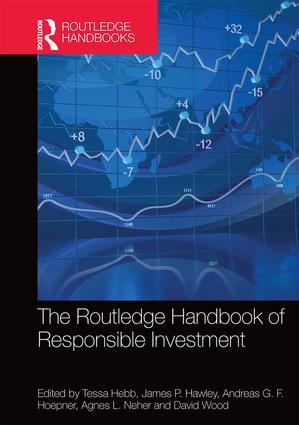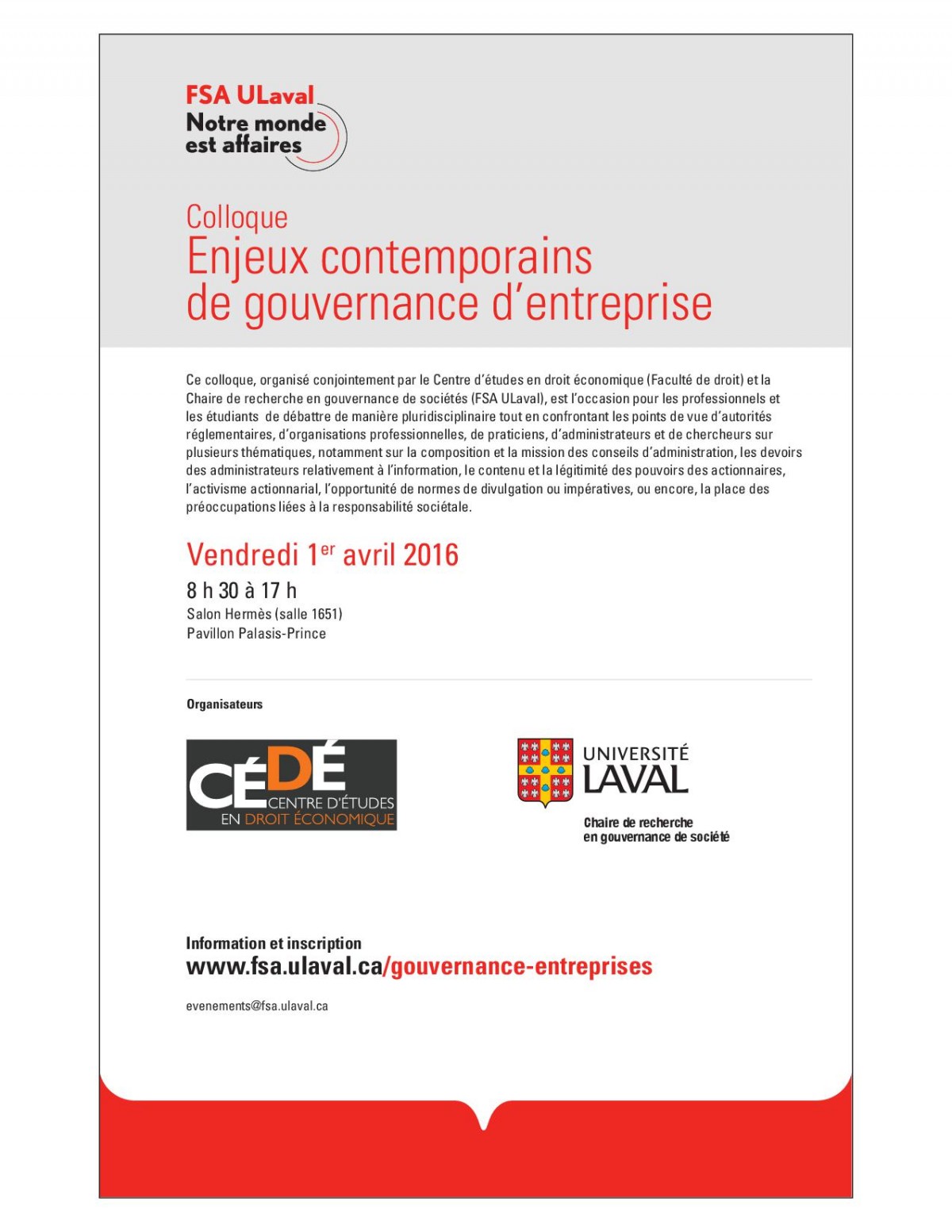normes de marché | Page 13
autres publications normes de marché
En savoir plus sur l’ISR ?
Ivan Tchotourian 25 mai 2016
Bonjour à toutes et à tous, si la problématique si actuelle de l’investissement socialement responsable (ISR) vous intéresse, nul doute que ce bel ouvrage suscitera votre curiosité : « The Routledge Handbook of Responsible Investment » (T. Hebb, J. P. Hawley, A. G.F. HOEPNER, A. L. Neher et D. Wood) chez Routledge.
The UN-supported Principles for Responsible Investment initiative has led to around a third of the world’s financial assets being managed with a commitment to invest in a way that considers environmental, social or governance (ESG) criteria. The responsible investment trend has increased dramatically since the global financial crisis, yet understanding of this field remains at an early stage.
This handbook provides an atlas of current practice in the field of responsible investment. With a large global team of expert contributors, the book explores the impact of responsible investment on key financial actors ranging from mainstream asset managers to religious organizations.
Offering students and researchers a comprehensive introduction to current scholarship and international structures in the expanding discipline of responsible investment, this handbook is vital reading across the fields of finance, economics and accounting.
À la prochaine…
Ivan Tchotourian
normes de droit normes de marché rémunération
Retour sur un échec
Ivan Tchotourian 21 mai 2016
Un article du Financial Times (“Why it is time to curb the madness of executive pay”, 9 mai 2016) de Patrick Jenkins revient sur les contestations entourant la rémunération des hauts-dirigeants.
Earlier last week, the FT revealed that Norway’s oil fund would start making an example of companies that overpaid their bosses. In the UK, the Investment Association has asked Nigel Wilson, chief executive of Legal & General, to lead a task force on a similar issue. On Sunday, in an online debate of the FT City Network — a panel of top-rank financiers — Mr Wilson complained that the current system of executive pay was “very obviously not fit for purpose”. Participants said this was bad for shareholders, but also morally bad for society given the widening gap between executive pay and average wages. It is about time the topic gained momentum. In the US, average pay for a top chief executive is more than 300 times median salaries, according to the Economic Policy Institute. In 1965, it was just 20 times. In the UK, that multiple is now 183 times, according to the High Pay Centre.
À la prochaine…
Ivan Tchotourian
autres publications Gouvernance normes de marché rémunération
« How incentives for long-term management backfire » : cela fait réfléchir !
Ivan Tchotourian 16 mai 2016
Le Harvard Business Review propose un article intitulé : « How incentives for long-term management backfire” qui prend le contrepied de la croyance voulant que les plans incitatifs basés sur la performance à long terme seraient une cause du court-termisme de la direction des entreprises.
In the five years since the advent of Dodd-Frank regulation, corporate governance groups, with their policies requiring at least half of long-term incentives to be “performance-based,” have pushed companies to replace options with multi-year, performance plans. How could anyone object to such an effort? Hardly anyone, except here is the rub: Performance plans require performance targets, and in most companies, planning works in three-year cycles. The logical performance period for long-term incentives is one that matches those cycles. Three years has thus become the standard performance window for measuring achievement.
So a three-year horizon — not even a presidential term — has inexorably become the norm for investing hundreds of billions of dollars of money aimed at creating “long term” value. With the best of intentions, many proxy advisors and long-term investors have widely blessed three years as appropriate, adopting three-year pay for performance as their standard comparison. Today, four out of five S&P 500 companies use a three-year performance period in their long-term incentives. But executives today, who are paid on this new “long term,” typically with equity based partly on earnings-per-share performance, naturally think twice about retaining earnings for projects beyond three years. Their measurements conflict with their managerial inclinations, encouraging them to use earnings booked today to immediately return cash to shareholders.
À la prochaine…
Ivan Tchotourian
Normes d'encadrement normes de droit normes de marché
L’ISR : ça compte !
Ivan Tchotourian 13 mai 2016
Dans un récent billet intitulé « L’investissement responsable a-t-il une influence réelle sur son secteur? », Diane Bérard confirme la pertinence de l’orientation en faveur de l’ISR.
Oui, affirme Steve Lyndenberg, associé chez Domini Social Investment, créateur du Investment Integration Project et conférencier au colloque CFA Montréal.
En février dernier, la firme Morningstar annonce qu’elle ajoute une nouvelle forme d’évaluation à 20 000 fonds d’investissement. Ceux-ci seront aussi évalués selon les critères de l’investissement responsable ( ESG pour performance environnementale, sociale et de gouvernance). Chaque société composant le fonds est évaluée individuellement. Les scores sont ensuite cumulés pour obtenir le score du fonds.
À la prochaine…
Ivan Tchotourian
autres publications Normes d'encadrement normes de droit normes de marché
Rapport 2015 de la SEC à propos des agences de notation
Ivan Tchotourian 31 mars 2016
La Securities and Exchange Commission (SEC) a publié en décembre 2015 son rapport annuel sur les agences de notation : « 2015 SUMMARY REPORT OF COMMISSION STAFF’S EXAMINATIONS OF EACH NATIONALLY RECOGNIZED STATISTICAL RATING ORGANIZATION ».
This report summarizes the examinations conducted by staff from the U.S. Securities and Exchange Commission (the « Staff ») under Section 15E(p)(3) of the Securities Exchange Act of 1934 (« Exchange Act »).1 This is a report of the Staff and, as such, reflects solely the Staff’s views. The U.S. Securities and Exchange Commission (« Commission ») is making this Staff report public as required by Section 15E(p)(3)(C) of the Exchange Act.
Un article de
Les Échos.fr (
ici) nous apprend :
« La SEC montre qu’elles sont prêtes à beaucoup pour gagner des parts de marché. L’une d’entre elles a noté une obligation sans avoir été sollicitée, pour ravir le marché à l’un de ses concurrents. Sa notation étant plus favorable que l’autre, elle a l’espoir que le client lui donnera le marché la fois suivante. Les procédures de notation restent parfois arbitraires, ajoute la SEC. Des notes qui avaient été données par des analystes ont ainsi été modifiées « à la demande de leurs supérieurs hiérarchiques », en violation des règles internes. Des notations ont par ailleurs été attribuées, qui différaient de celles produites par le modèle quantitatif de l’agence. Celle-ci n’a pas expliqué les raisons du changement ».
À la prochaine…
Ivan Tchotourian
conférences devoirs des administrateurs Gouvernance Normes d'encadrement normes de droit normes de marché Nouvelles diverses objectifs de l'entreprise
Colloque en gouvernance : cela approche !
Ivan Tchotourian 21 mars 2016
Bonjour à toutes et à tous, je vous rappelle que le colloque sur les enjeux contemporains de gouvernance d’entreprise organisé par le Centre d’études en droit économique (Faculté de droit de l’Université Laval) et la Chaire de recherche en gouvernance de sociétés (FSA de l’Université Laval) arrive bientôt !
Vendredi 1er avril 2016
8 h 30 à 17 h
Salon Hermès (salle 1651)
Pavillon Palasis-Prince
Cette rencontre du droit, de l’administration et de la finance permettra aux professionnels
et aux étudiants de confronter leurs point de vue sur plusieurs thématiques :
- Composition et mission des conseils d’administration
- Devoir des administrateurs
- Contenu et légitimité des pouvoirs des actionnaires
- Activisme actionnarial
- Opportunité de normes de divulgation ou impératives
- Place des préoccupations liées à la responsabilité sociétale
Information et inscription : www.fsa.ulaval.ca/gouvernance-entreprises
Formation d’un dispensateur reconnu aux fins de la formation continue obligatoire du Barreau du Québec pour une durée de 5 heures.
À la prochaine…
Ivan Tchotourian
conférences Gouvernance Normes d'encadrement normes de droit normes de marché Nouvelles diverses
Colloque du 1er avril en gouvernance d’entreprise : bio en ligne
Ivan Tchotourian 15 mars 2016
Bonjour à toutes et à tous, dans le cadre du colloque sur les enjeux contemporains de gouvernance d’entreprise organisé par le Centre d’études en droit économique (Faculté de droit de l’Université Laval) et la Chaire de recherche en gouvernance de sociétés (FSA de l’Université Laval) qui aura lieu le 1er avril 2016 de 8 h 30 à 17 h, le site Internet a été récemment complété. Une grande partie des biographie est maintenant en ligne !
Pour consulter ces bio, il vous suffit de cliquer ici.
N’oubliez pas de vous inscrire !
À la prochaine…
Ivan Tchotourian



